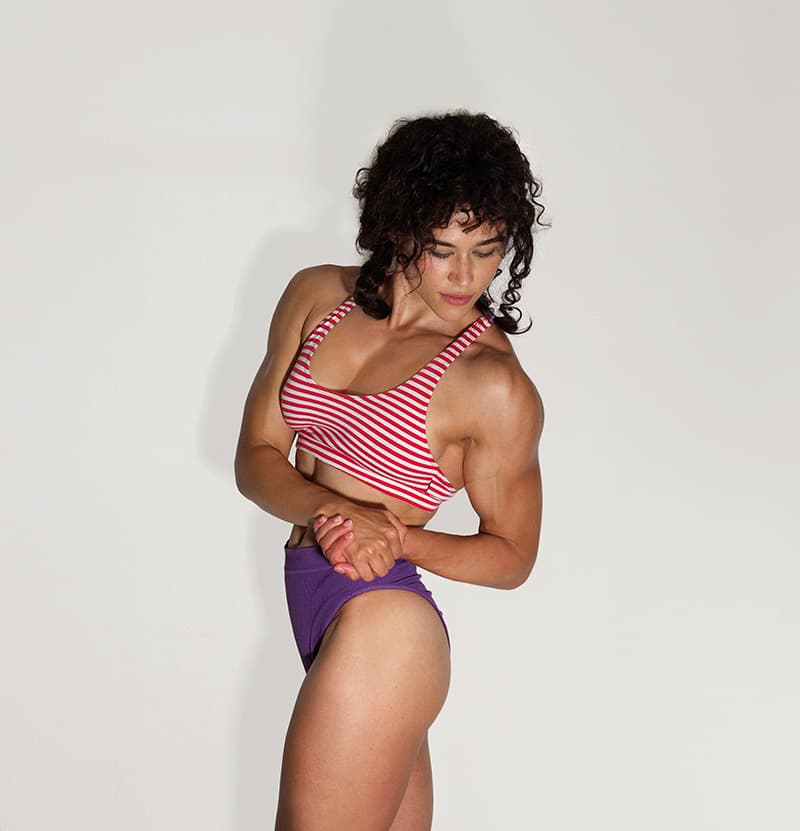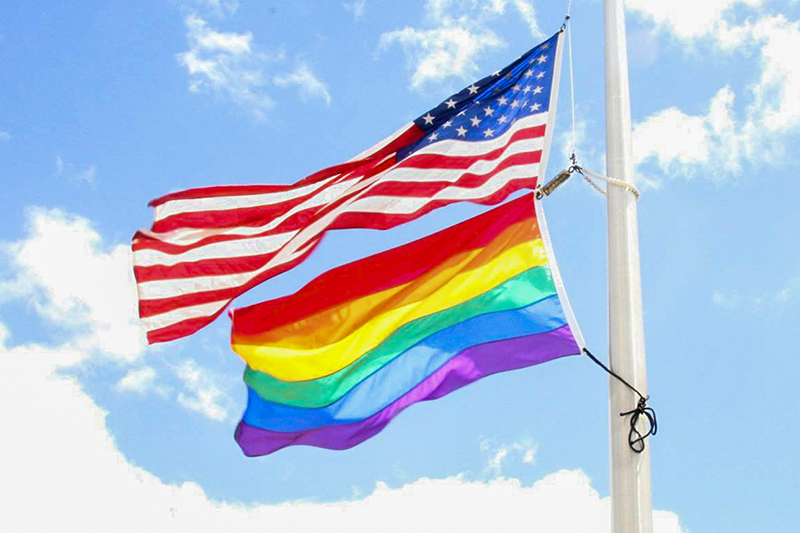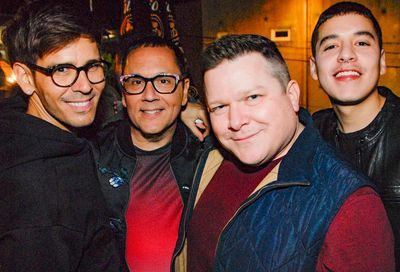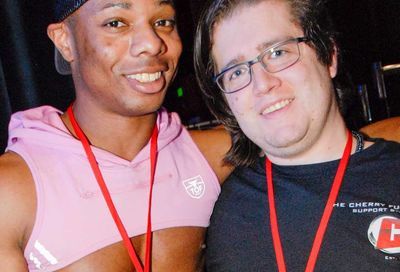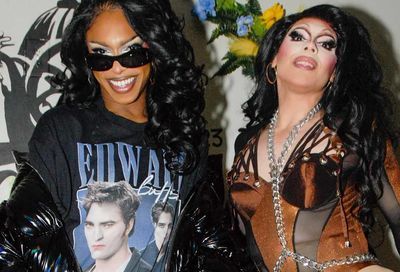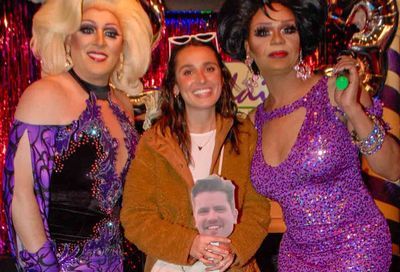Don Lemon on Donald Trump, Black Pride, and the pressure of unfair expectations
CNN's Don Lemon wants to be "the best person to tell the story."

“Are you trying to get me into trouble?”
Don Lemon laughs heartily as he responds to a question about whether CNN colleague Anderson Cooper is as good looking in person as he is on television.
“I will say this,” Lemon says, after a breath. “Anderson and I share the same floor. We’re right across the hall. We’re mirror images of each other. If he walks out and stands in his door and I stand in mine, we look right at each other. Anderson is a very smart guy. Very nice guy. And on top of that he’s very handsome as well.”
Lemon himself is no slouch in the looks department. But as host of CNN Tonight, attractiveness only goes so far. Lemon brings smarts to his show, which tackles current affairs — these days, mostly the gonzo presidential campaign — with the atmosphere of a guided free-for-all. More often than not, Lemon expresses a visible sense of bemusement at the tirades his guests engage in. Yet he invariably retains full control, often refusing to let the various pundits, politicians and celebrities issue carte blanche proclamations or artfully dodge the facts.
“Last night, I had someone on who kept giving me the talking points about why Donald Trump would not release his tax returns,” says Lemon. “He said, ‘Well, he’s been given advice by his attorneys.’ I said, ‘Well, that’s not an answer, because the IRS says there’s nothing to prevent you from releasing tax returns.’ ‘Well, his counsel says that it’s not in his best interests.’ And I said, ‘That’s still not an answer…. Even if he doesn’t want to release those years, there are the years that are not being audited that he can release.’ And I kept pressing him. My guests just look at me, and smile or laugh, because they realize I’m not going to let them get away with it.”
Born and raised in Baton Rouge, Louisiana, the congenial, good-natured journalist worked for several years at NBC’s New York operation, which included appearances on Today and NBC Nightly News, before moving over to CNN in 2006. His 2011 memoir, Transparent, chronicles his life in the newsroom, but also digs deep into the personal, delving into sexual abuse encountered as a child, and serving as a launching pad for the then 45-year-old to come out to the public. Lemon made the decision to go public because he felt it would give his audience better insight and perspective into who he is. Over the course of an hour-long phone interview, he notes that the rise of social media and the public’s thirst for knowing every detail about a celebrity’s life have forced well-known broadcast journalists to appear more human.

“People know that we have personal lives,” he says. “I don’t have to be a ‘Flat Stanley’ — this guy in a suit that you project whatever you want to on. You’d think, ‘Oh, there’s Don Lemon. He must have two and a half kids and a really beautiful wife,’ right? ”
I no longer have to be a one-dimensional cardboard cutout on television,” he continues, adding that he now has the “freedom to be multidimensional, to just be more authentic.”
Like anyone with national platform, Lemon has had his share of controversial moments. He drew (admittedly) unfair derision when asking former Transportation Inspector Mary Schiavo if crackpot theories that Malaysian Airlines flight 370 had been swallowed by a black hole were even plausible. (“I know it’s preposterous, but is it preposterous, Mary?”) He was heavily criticized by the Black community for his coverage of the racially charged riots in Ferguson, Missouri, following the death of Michael Brown. Setting the scene at the riots, he noted that “obviously there’s a smell of marijuana in the air as well,” and was pilloried for meeting with Darren Wilson, in an attempt to obtain a first exclusive interview with the officer who shot and killed Brown. He takes the criticism in stride, retreating when necessary (he apologized for an off-the-cuff comment made to a victim of Bill Cosby’s), but more often than not holding his ground. He is part of the new breed of journalist — one with an opinion on just about everything and yet one who proffers it only to elicit all points of views from every possible angle. Even if that angle includes black holes.
“I’ve had to develop a very thick skin in this business, especially being….” he trails off. “If you look around, you will see that I’m the only person like me in Prime Time, a Black man who happens to be gay — so I get it from everybody. It’s tough. It ain’t easy.”
Lemon makes it look easy, however. And he’s got the honors to prove it, among them an Emmy and a prestigious Edward R. Murrow. In 2009, Ebony magazine heralded him as one of the 150 most influential African-Americans in the nation.
Lemon is a broadcast news celebrity. And with celebrity comes a certain loss of privacy — yet he’s found ways, especially as a gay man living in Manhattan — to keep his private life just that. He laughs when jokingly asked if he has ever had a Grindr account.
“I don’t have one!” he says, before turning reflective on the topic.
“Listen,” he continues. “This is funny that I’m talking about it, because I actually talked to my PR person at CNN about joining Tinder. I happen to be a single man right now. And you know, it used to be not acceptable to date online. But right now it’s very acceptable, and I’m like, ‘You know, maybe I’m missing out because everybody has a social media meeting app for dating. ”But, you know, at the end of the day, I think personal interaction is more important than seeing a headless torso. I believe in love and romance. I would rather awkwardly flirt with someone at a bar, at the gym, at the library, on the subway, on the street, in the store. I’d rather do it the old-fashioned way than having to use a social media app.”
Welcome to the values of Don Lemon.
METRO WEEKLY: Let’s kick off with the craziness that’s defining this year’s election. What’s it like to be covering it? Can you even put it into words?
DON LEMON: This is unlike anything that I’ve ever seen. We thought 2008 was interesting with the first Black president possibly being elected, but I’ve never seen anything like this before in politics. It’s thrilling because you never know where it’s going to go. I feel honored and privileged to be able to be at this level, to be able to interview these people, and to be able to offer the American voter perspective.
MW: Much has been written about the fact that the media took Donald Trump for granted — “Oh, he’ll never make it that far, he’ll self-implode” — and yet he just kept making it further until he became pretty much unstoppable.
LEMON: I want you to take note of this. Out of all of the people who started covering this, I took it completely serious from the beginning. I said last summer that Donald Trump was probably going to be the Republican nominee. I gave my reasons why and people laughed at me. I never discounted or underestimated Donald Trump. Here’s why: Donald Trump is used to the shark-infested media waters of New York. This is the toughest media market in the country, not only locally, but nationally and internationally. So he’s used to manipulating the media in his own way. If you have someone who is able to do that as the biggest reality star in the world, I don’t think you should discount that. And if someone says they’re running for president, I take them at their word.
Trump was touching upon something that people had not quite tuned into yet, because I had interviewed him a couple times. I would be on the elevator, I’d be on the treadmill, I’d be getting out of the subway, I’d be walking down the street, I’d be in a restaurant and people would come up to me and go, “Hey, I saw your interview with Donald Trump.” And they’d look over both their shoulders and then whisper, “I kind of like him. I don’t agree with everything he says, but you know what? I might vote for him, because we need someone like him.” I kept hearing that and hearing that and hearing that, so I knew he was onto something.

MW: I don’t mind saying that the prospect of a Trump presidency horrifies me.
LEMON: [Laughs.] Listen, that’s not to say that I support him or agree with him. That’s not my job as a journalist — I’m not for any candidate. I’m just here to be the best one to tell the story. But I’m also here to give you reality. And I saw the reality from the very beginning that many people were not able to see because they were blinded by their ideology. If they were a staunch conservative who believed in traditional conservative values, they didn’t like Donald Trump. If they were a progressive, liberal or someone who supported Bernie Sanders or Hillary Clinton, they did not believe in Donald Trump. I can understand when people are horrified by it. I’m not saying that it’s right or whatever. It’s just the reality.
MW: The reality now is that there are polls out where he’s beating Hillary.
LEMON: I know. How do you feel about that? [Laughs.]
MW: Not happy. I’m not going to get into my feelings about this, but it’s nuts.
LEMON: Yeah, up is down, and down is up. We thought that there would be a contested Republican Convention. No contested Republican Convention now. But possibly a contested Democratic Convention. Isn’t that something?
MW: Something is the word for it. One thing I enjoy about your show is you often press quite hard if somebody is dodging. I find that especially galling with most broadcast journalists and Trump. He’ll dodge a question, and after a few feeble attempts at trying to get him to answer, they simply back off and go to another question. It bugs me.
LEMON: I’m not afraid of pressing him, but also it is television — it’s not a prize fight. You can press as much as you want and sometimes people will never answer your question, and all you can do is point out that they’re not answering your question. I can’t get up from the chair if I happen to be in a face-to-face with Donald Trump and go over and shake him and say, “Answer my question!” It just doesn’t work that way. So you can press and press as much as you can, to the point where you say, “Okay, I guess you’re not going to answer my question,” or through your questioning, you show that they’re not answering. I think the viewer is smart enough to realize when someone is obfuscating or just avoiding the answer.
MW: Trump is astonishingly thin-skinned. He said at one point that he wanted to be able to sue the media. If he becomes president, is the media’s coverage of the presidency going to be altered by that attitude?
LEMON: I don’t know. I know that he has sued Bill Maher, but one must remember that Hillary Clinton has not been so friendly with the media as well. She’s kept the media roped off in a bullpen. The Obama administration has not been that forthcoming with the media. I don’t think any politician really likes the media. I don’t think Donald Trump is an exception. The interesting thing — and the thing that you must give him credit for — is that he says it out loud. Most of the other people will not say it out loud. They’ll just blackball you where they won’t do interviews with you, but they won’t say it publicly. He is the one that just says it out loud, like, “I don’t like them. I’m not doing an interview with them.” I would prefer a Donald Trump approach to someone who blacklists you, and you don’t know why and never hear from them. I want to know.
MW: Trump made a point about the taxes, saying that before the days of Nixon, the media didn’t pry into candidates’ lives this way. Is he right to some extent? Has our culture gotten to the point where it is almost too much? Are we so fixated and overloaded on every little last detail about a person, tearing them apart, that the issues get cast aside?
LEMON: I’m of two minds about this. We’ve always pried in the lives of people who wanted to be president. We just couldn’t do it to the extent that we can do it now. If the technology was available at any point in history, I think we would have done the same thing. I actually think it’s quite important to vet our political candidates, especially the people who are going to be leaders of the free world.
Now, having said that, we should not put them in a position where we know almost everyone is excluded from being president, because we all are human, we all make mistakes, we all do things that we’re not proud of. And I think we should take that into account and allow people to be human and to have flaws. I don’t really care unless you are using it in some way that hurts the public. Whatever it is that happens to be your particular flaw or fault or predilection, I don’t think that that should preclude you from being president. I think we should say, “Listen, this person is human. So let’s allow them that. This person has a past. Let’s allow them that.”
Donald Trump was not running for president at the time of some of his particular dalliances. The New York Times made an issue of how he treated women. In the workplace, it’s a different story. You should be held to a higher standard, especially if you are the boss, but if you are a young man who is in the middle of a divorce or who is single and you are out trying to woo a model, I mean, what’s wrong? That’s what happens. Everyone tries to woo someone. Everyone wants companionship. Everyone wants to be with someone who is attractive. If you’re a single person and you’re going out with a different woman every night of the week, that’s your business. That’s the freedom of being an American. And if you happen to be a billionaire and you throw a party at your home, of course you’re going to have models there. I don’t hold that against him. And I don’t think that should preclude anybody from being President of the United States. It doesn’t mean you’re going to be someone who governs poorly because you have made personal mistakes in your past.

MW: Do you think tigers can change their stripes?
LEMON: Simple answer, I do. Listen, I think you sometimes have an epiphany in life and realize that you need to change. I think age does that. Wisdom cannot be taught. And I always say that, for me, wisdom is the most important attribute that you can have, because it’s earned — it’s earned through time on the planet. There is nothing that teaches you like time on the planet.
MW: How old are you?
LEMON: I am five-zero. I turned this year. Milestone.
MW: That’s what the Internet says, but you can’t always believe the Internet.
LEMON: Well, I’m 30 then. [Laughs.]
MW: I thought you were about 35.
LEMON: Good, then write that. “Looks 35, but is older.” You know what? Most people say I look younger in person than I do on television. That’s just genetics. I had nothing to do with it. I think it helps that I try not to take anything personally and try not to let anything bother me for too long. I don’t hang onto things. I just keep moving. I don’t look back. I know it sounds like a cliché, but I believe age is nothing but a number. I don’t feel any older than I felt when I was in my 20s or 30s. I feel wiser and I feel free. I feel like I’m a truly emancipated person. Maybe that’s it. Maybe people see that — I think it’s all just sort of energy.
MW: Well, whatever you’ve got going there is working for you. You came out in 2011, in your memoir.
LEMON: Randy, I had been out. I have not been in since my 20s. I just didn’t talk about it publicly. My co-workers knew. My bosses certainly knew. It was an open secret. I just didn’t talk about it in public. And then I decided there’s a certain degree of deception in silence. I thought it was important for people to be able to see that even their news guy is gay.
MW: Has it changed anything for you in the years since?
LEMON: Yes. I have no secrets. I mean, I would like to have some privacy. It’s weird, but the longer you’re on TV, especially in Prime Time, people recognize you. I walk down the street and people are like, “Can I get a picture?” It’s a little off-putting. But I have no secrets. I have nothing to hide from anybody. I am who I am. You know who I am. You know what I am. It makes me that much more transparent and honest on television, because I have the same rules for myself that I have for the people I interview, for my guests. If you’re going to come on television and have a national or international platform, then you need to be honest and straightforward with the American people, and with people who are watching. So I have a freedom that I don’t know if many people have, especially in this position. That has been part of my success in the last couple of years — being able to come out and be open and honest. Here I am. Accept me for all of who I am or you don’t have to. I don’t really care.
MW: Does being out make covering gay issues more personal for you?
LEMON: No, it makes me better at it. Listen. It is personal. I am a person of color. When issues of color and race come up, I understand as an American and a viewer and a journalist in a better way than many people who may not have that same understanding. I am a man who happens to be gay. So I understand LGBTQ issues in a way that many Americans do understand them and some Americans don’t. And that offers me a better insight and perspective.
MW: But if you have a guest on who’s virulently anti-gay, you have to keep it in check.
LEMON: I do. I get a lot of heat for it, but I do keep it in check, because we are all Americans and under our Constitution we all deserve equal protection. Just because you may feel a certain way politically, or feel a certain way with your religion, it doesn’t give you the right to discriminate against anybody else. Those views are your views. That’s the only perspective that you have to really keep as a journalist. And I know that.
MW: Do you think homophobic guests are now more careful about how they approach the topic on your show?
LEMON: Yes, yes.
MW: Is that bad?
LEMON: No, because I think they should be careful. I think we should always be thinking about how we are treating other people and we should always be mindful and respectful of what other people may be dealing with. When someone comes on my show, they’re going to have to do their research. They’re going to be on point about issues that have to deal with LGBT issues or issues of race, because they understand I have a certain perspective and background that I think makes me a bit more insightful on those issues. I’m definitely going to challenge them.
MW: In the early years, did you face any challenges at work due to your sexuality or your race? Are there any incidents you can think of?
LEMON: Probably. I think that I have faced more overt discrimination for being a man of color than I have for being a gay man. From the larger culture, I’ve had to deal with homophobia from all races, which is an interesting thing for someone in my position. People expect me, because I’m Black and I’m gay, to automatically be liberal and to have certain points of view. People of color expect me to have certain points of view at all times. And gay people expect me to have certain points of view at all times. In a way that other journalists don’t have to face. No one asks Wolf Blitzer or Jake Tapper or, for that matter, Anderson, to be the spokesperson for all Jewish people or all white people or all gay people. For some reason, as a man of color who happens to be gay, people expect me to be the spokesperson for all people of color and for all gay people and then the two combined. That’s really an unfair expectation to hold on a person.
At the end of the day, I am a journalist who happens to be Black, who happens to be gay, and who happens not to be neither liberal nor conservative. I don’t really take a political bent. I don’t believe in political parties. That’s hard for people to understand. Just because you have a D in front or behind your name, doesn’t mean that I should vote for you just because. If you don’t share my values, then I’m not going to vote for you. I don’t care what political party you’re from. If you’re a horrible homophobe or if you’re Islamophobic or if you’re a xenophobe, any of those things, I’m not voting for you. I don’t care what your political party is. I don’t vote for people because they’re a certain letter.
I think that each one of the political parties we have can do a better job serving all Americans, especially people of color, especially LGBT. I think sometimes, especially when it comes to the Democratic Party that we — people of color or the LGBT community — will throw votes behind them just because. I think that we should be looking at all people — Republican, Democrat, Independent — as to who we’re going to vote for and stop relying on two political parties so much. I don’t really understand that and never have.

MW: What are your values?
LEMON: It depends on what you’re talking about. This sounds cliché, but I really do believe that all people, no matter our background, no matter our race, no matter our religion, no matter what our sexual orientation is, whether we’re trans or straight or gay or bi or questioning or cis or Jewish or whatever, we should all be treated equally. That should never be questioned under our Constitution.
And whatever your religion is — because religion at the highest degree teaches you to turn the other cheek, to be good to your fellow man — we should never question who gets rights and who doesn’t get rights, and who should be able to get married. We should all be treated equal. If we lived in a different country, that’s a different thing, because their constitution may not be based on the type of democracy or principles that our Constitution was based on. So that’s what I believe.
I also believe that if you’re a liberal, then you should be able to listen to conservatives. You should be able to have conservative friends. You should be able to argue with conservatives. You should not ban them or not allow them to speak. And I believe the same thing if you’re a conservative. I have friends who are liberals, who are conservatives, who are atheist, who are very religious, who are Jewish. If I had a dinner party and I invited every single friend I knew, you wouldn’t know where I stood on religious values or values of sexuality or values of politics. You wouldn’t know because I invite everyone into my life. Those are my principles. Those are my values. Everyone is included.
MW: Good values.
LEMON: Let me tell you: When we meet people who are not like us or who we may disagree with, instead of judging them or shutting them out, we should become curious about why they feel the way they feel. And that will change your entire perspective. Be curious about someone. Why does this person feel this way? Who is this person? Maybe they don’t understand a certain thing. Maybe you can teach them something. Maybe, at the end of the day, you won’t be able to, but the best thing to do is to be curious about them rather than be judgmental.
When I grew up, the Klan would hand out literature on the corner of my high school, okay? It was a small town in Louisiana called Baker, Louisiana. My best friend, John DuPree lived out in the country. And the next lot over was the Grand Dragon of the KKK. And when my mom found out they lived so close, she wouldn’t allow me to go over to his home anymore and she said, “He’s going to have to come here.” I remember going to a party at Central High School, which was in a neighboring community, getting out of the car and some guy standing at the door with a gun saying, “Don’t even get out of the car, nigger.” As a journalist, I would want to talk to those people. Doesn’t mean that I want to be friends with them. It doesn’t mean that I want them in my life, but I certainly want to hear from them. It’s the devil you know. I would like to know where people stand, as I said earlier in the conversation, than to not know.
I got so much flak from certain people for wanting to interview Darren Wilson and for meeting with him in Ferguson. It was the oddest thing. I did not understand why members of my own community wanted to limit me as a journalist by not allowing me the opportunity. Every journalist in the country wanted that interview, but for some reason, they said that I should not do the interview and I was a traitor for wanting to do the interview. It’s absurd.
MW: Does it bother you when a community you’re part of criticizes you?
LEMON: What bothers me is what I call the “Black Box,” that in order to be an authentic Black person, one must live and operate within certain parameters. And that is limiting. Why would you ever want to limit someone to a certain way of being? You want to expand. That is a mentality I don’t quite understand. Maybe it’s rooted in slavery. I have no idea, but I don’t believe in the “Black Box.” I don’t believe in being limited by the larger community. And I don’t believe in being limited by people of color as well. That is a limitation on their part, not my part. So I don’t view it as a criticism of me. I view it as a limitation on the parts of the people who are doing the criticizing.
MW: The face of our television news is overwhelmingly white and male. Are our news channels not addressing diversity well enough?
LEMON: Are you trying to get me in trouble?
MW: No, but it’s a valid question.
LEMON: I’ll give you an honest answer. No, I don’t think we’re addressing diversity as we should. Diversity is very important. And if you look over the political coverage, especially this last election cycle, the issues that we’ve been talking about — Black Lives Matter, police brutality, income inequality, immigration, all of those things — all of the candidates addressing those things, before Ben Carson got out, were white men and two white women. And then you have all the people who are doing the interviewing and the moderating, all white. [Editor’s note: Lemon did participate as a questioner in CNN’s Flint Democratic Debate.]
So are we addressing it? No. Is it a difficult conversation? Yes. People who make the decisions about who gets to do that, might they have blind spots? Yes. Do they want to hear it? Maybe not, I don’t know. Is it something we need to address? Absolutely. And I would be the first person to raise my hand and start the conversation about how we address it because it’s high time that we do.
MW: This is our Black Pride issue. Have you ever been to a Black Pride celebration?
LEMON: Yes. I lived in Atlanta for a long time and gay Black Pride is a big event there.
MW: What do you recall about it?
LEMON: Rarely does one see a large group of gay Black people, especially Black men and women together as one. It’s really refreshing to be able to see that, especially when you consider how closeted many of us have had to be for many years because of religious or societal reasons. So that’s refreshing. But my memory is just of standing in one of the Peach Tree streets, avenues, boulevards in Atlanta and the overwhelming majority of the people being there being Black and gay rather than of the larger culture. Very often I’m the only Black person in the crowd when I go to many places, so that is refreshing to me. That’s just my memory.
MW: How should the Black LGBT community celebrate its Pride?
LEMON: I think they should celebrate their beauty. Black gays should celebrate how much influence they have on the culture. If you look at the culture, you look at popular television, you look at many magazines and at fashion — let’s just be honest, a lot of it, if not most of it, stems from Black gay people. We should be proud of that and we should own it more. We should monetize it more. We should build wealth more and we shouldn’t hide from it. I think we should also make an investment in the future by coming out and refusing to be in the closet and on the DL. Be proud to be gay and Black and stand up for it. It is a virtue in many ways — and it’s not something that one should be ashamed of. I’m very proud of being a Black gay man in America.
CNN Tonight with Don Lemon airs nightly on CNN at 10 p.m. EST. His memoir, Transparent (Farrah Gray Publishing, 2011), is available at Amazon.com. Follow him on Twitter at @donlemon and @CNNtonight.
Support Metro Weekly’s Journalism
These are challenging times for news organizations. And yet it’s crucial we stay active and provide vital resources and information to both our local readers and the world. So won’t you please take a moment and consider supporting Metro Weekly with a membership? For as little as $5 a month, you can help ensure Metro Weekly magazine and MetroWeekly.com remain free, viable resources as we provide the best, most diverse, culturally-resonant LGBTQ coverage in both the D.C. region and around the world. Memberships come with exclusive perks and discounts, your own personal digital delivery of each week’s magazine (and an archive), access to our Member's Lounge when it launches this fall, and exclusive members-only items like Metro Weekly Membership Mugs and Tote Bags! Check out all our membership levels here and please join us today!





